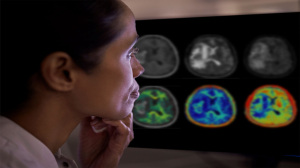por
John R. Fischer, Senior Reporter | March 07, 2024

Philips Smart Quant Neuro 3D MR imaging AI application.
Philips, in collaboration with AI software developer SyntheticMR, has developed a decision-support tool for diagnosis and treatment planning of brain diseases such as multiple sclerosis (MS), traumatic brain injury (TBI), dementia, and more.
The solution, Smart Quant Neuro 3D, makes recommendations based on automated quantitative measurements taken of various brain tissues to assess brain disease and progression. It can also be used to monitor the effects of therapy to suggest necessary adjustments in treatment, or form objective assessments of and differentiate traumatic brain injuries from other neurological conditions.
Smart Quant Neuro 3D utilizes Philips' AI-based SmartSpeed image-reconstruction technology, Philips 3D SyntAc clinical application, and SyntheticMR's SyMRI NEURO 3D quantitative tissue assessment software. These separate components together enable it to:



Ad Statistics
Times Displayed: 75267
Times Visited: 5317 MIT labs, experts in Multi-Vendor component level repair of: MRI Coils, RF amplifiers, Gradient Amplifiers Contrast Media Injectors. System repairs, sub-assembly repairs, component level repairs, refurbish/calibrate. info@mitlabsusa.com/+1 (305) 470-8013
- Provide precise 3D segmentation and volume measurement: MR scans are often subjective and not as accurate for diagnosing brain disease, and measuring tissue volume with 2D image slices is virtually impossible. Smart Quant Neuro 3D utilizes AI to create and verify 3D segments and measure volume in white matter, grey matter, cerebrospinal fluid, and myelin to provide trained physicians with useful information for making diagnoses.
- Phase out symptom-based tests: These are the only standard for diagnosing TBI.
- Facilitate early TBI diagnosis and intervention: Loss of myelin is a primary indicator of TBI, and Smart Quant Neuro 3D can detect abnormalities invisible on conventional MR scans. Its quantitative measurements allow clinicians to assess the extent and impact of TBI and distinguish it from other neurological diseases.
- Adjust treatment for progressive brain diseases: Through quantitative myelin measurements, the solution can show clinicians how effective disease-modifying drugs are.
- Reduce imaging: Additional data is collected from myelin measurements in a single acquisition, allowing patients to avoid being called in again for additional imaging.
- Make imaging 3X faster: The solution uses Philips' AI-based MR SmartSpeed reconstruction technology and provides up to 65% greater resolution, helping accelerate radiology department throughput. SyntheticMR's SyMRI NEURO 3D software performs automatic (zero-click) analysis of the imaging data to provide accurate segmentation and volume measurement of tissue in less than 10 seconds of post-processing.
"Smart Quant Neuro 3D allows for shorter exams and exploration of quantitative metrics, which show great potential to better stratify patients with similar imaging characteristics on conventional MR sequences. It's a fast quantitative MR technique that's integrated into our clinical workflow, allowing us to generate multiple synthetic weighted images from a single sequence," said Dr. Julien Savatovsky, neuroradiologist and head of the radiology department at the Hospital Foundation Adolphe De Rothschild in Paris, France, in a statement.
Back to HCB News

